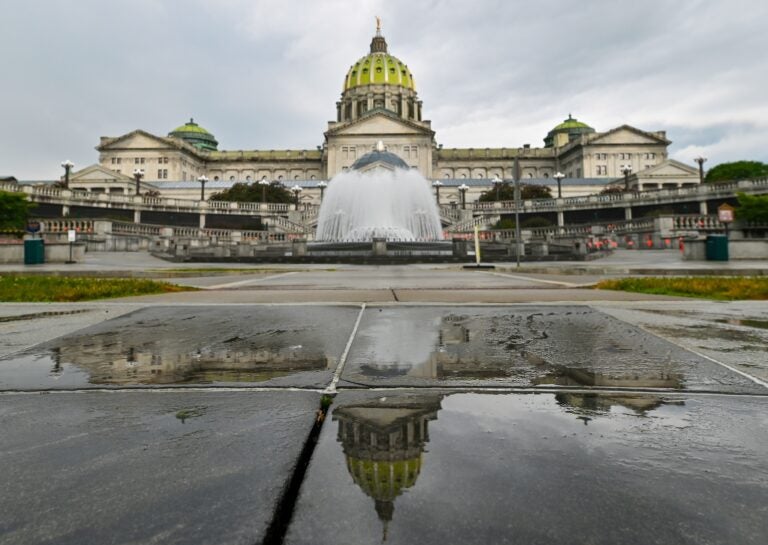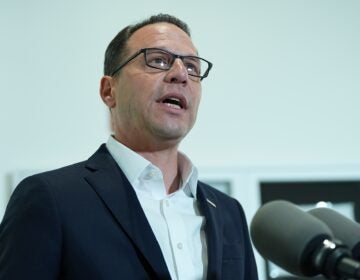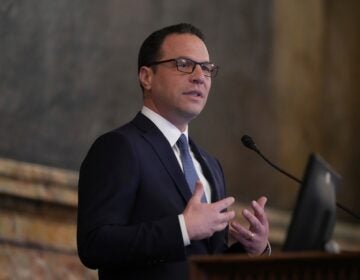Pennsylvania ends budget stalemate, sealed with concession by Democrats on climate
Pennsylvania is passing a $50 billion spending package to end a four-month budget stalemate that has held up billions for public schools and social services.

FILE - The Pennsylvania State Capitol is reflected on the ground June 30, 2025, in Harrisburg, Pa. (AP Photo/Aimee Dilger, File)
Billions of dollars for Pennsylvania’s public schools and social services could soon start flowing after four-plus months of delay, as lawmakers on Wednesday approved key elements of a roughly $50 billion spending plan to break the state’s budget impasse.
Democratic Gov. Josh Shapiro planned to sign key budget bills by the end of the day.
Under the $50.1 billion no-new-taxes budget deal, new authorized spending would rise by about $2.4 billion, or 5%, including some cash going onto last year’s books.
A concession to help seal a deal meant Democrats in the politically divided Legislature agreeing to Republican demands to undo a regulation aimed at making Pennsylvania the only major fossil fuel-producing state to force power plant owners to pay for their planet-warming greenhouse gas emissions.
Republicans called it a major policy victory for the energy economy in the nation’s No. 2 natural gas-producing state.
Democrats won’t get the amount of money that Shapiro originally sought in his initial budget proposal, but the deal — after weeks of closed-door negotiations — delivers substantial new sums to public schools, as Democrats had sought, and an earned income tax credit for lower earners.
It will also bring relief that the stalemate is over. Senate Majority Leader Joe Pittman, R-Indiana, called it an “imperfect product” that reflected the difficult compromises of a politically divided government.
“While it may have taken time, more time than any of us would have preferred, we have brought a divided government together and proved that it is not dysfunctional government,” Pittman said during remarks on the Senate floor.
The votes arrive weeks after counties, school districts and social service agencies warned of mounting layoffs, borrowing costs and growing damage to the state’s safety net.
School districts, rape crisis agencies and county-run social services have gone without state aid since July 1, when the state lost some of its spending authority without a signed state budget in force.
The agreement to back off the carbon dioxide cap-and-trade regulation on power plants comes six years after then-Gov. Tom Wolf made joining the Regional Greenhouse Gas Initiative the centerpiece of his plan to fight climate change.
Ending it is “one of biggest policy wins in the past 10 years,” Sen. Wayne Langerholc, R-Cambria, said.
Wolf’s regulatory plan had sidestepped resistant Republican lawmakers in a bid to make Pennsylvania — the nation’s second-largest natural gas producer — the only major fossil fuel-producing state to undertake a carbon cap-and-trade program.
It had yet to take effect while the state’s highest court considers a legal challenge that questions whether the carbon-pricing plan amounts to a tax, and is thus unconstitutional without legislative approval.
Backers of the regulation included environmental advocates as well as solar, wind and nuclear power producers who had called it the biggest step ever taken in Pennsylvania to fight climate change.
It was opposed by Republicans, fossil fuel interests and the labor unions that work on pipelines, refineries and power plants who warned that the cost was sending energy companies to other states to build new gas-fired power plants.
Shapiro had also expressed misgivings about it, and an alternative plan that he proposed has yet to receive traction in the Legislature amid Republican opposition.
Almost all of the overall spending increase would go toward Medicaid and public schools. Meanwhile, the budget didn’t deliver what Shapiro had sought in higher public transit aid, what counties had sought for mental health services or what providers such as insurers and home-care providers had sought in Medicaid reimbursements.
The budget plan holds the line on tax rates and fees, lawmakers say. But it uses billions in surplus cash to achieve balance, the second straight year that Pennsylvania is running a multibillion-dollar budget deficit, reflecting a slow-growing economy and a shrinking workforce that delivers relatively meager gains in tax collections.
The agreement also includes Pennsylvania’s first refundable earned income tax credit, which reduces or wipes out the state income tax for people who make less than a certain amount of money, depending on how many children they have. It’s something most other states have on their books.
Pennsylvania’s plan is projected to cost nearly $200 million a year. Had it been in effect this year, the average eligible family would have gotten a $650 break, lawmakers say.
WHYY is your source for fact-based, in-depth journalism and information. As a nonprofit organization, we rely on financial support from readers like you. Please give today.




